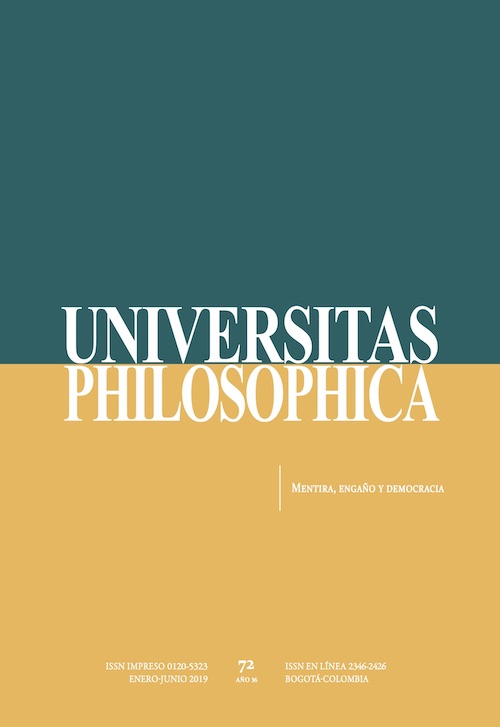Abstract
This article aims to systematize different alternatives for the conceptualization of lying, in order to clarify the meaning of contemporary post-truth. Given the limitations of a historical reconstruction of the meanings of lying devised by the philosophical tradition, and because conceptual analysis risks of fetishizing the lying assertion, we aim to enrich the conceptualization of lying through the lexicographical description of the prototypical sense and the variants of our idiomatic vocabulary for lying. By distinguishing the formal conditions of telling a lie and the situational nuances of the realization of lying, one can recognize a new regime of lies in contemporary post-truth.
Adler, J. E. (1997). Lying, Deceiving, or Falsely Implicating. The Journal of Philosophy, 94(9), 435-452.
Ball, J. (2017). Post-Truth: How Bullshit Conquered the World. London: Biteback Publishing.
Black, M. (1982). The Prevalence of Humbug. Philosophical Exchange, 13(1), artículo 4. Recuperado de https://digitalcommons.brockport.edu/phil_ex/vol13/iss1/4
Blecua, J. M. (Dir.). (2002). Diccionario avanzado de sinónimos y antónimos de la lengua española. Barcelona: VOX.
Bok, S. (1979). Lying: Moral Choice in Public and Private Life. New York: Vintage Books.
Carson T. L. (2010). Lying and Deception: Theory and Practice. New York: Oxford University Press.
Chisholm, R. M., & Feehan, T. D. (1977). The Intent to Deceive. The Journal of Philosophy, 74(3), 143-159.
Cooke, N. A. (2017). Posttruth, Truthiness, and Alternative Facts: Information Behavior and Critical Information Consumption for a New Age. Library Quarterly: Information, Community, Policy, 87(3), 211-221.
Cruz, M. (2017). La posverdad: entre la falsedad y el engaño. Uno, 27, 29-30.
D’Agostini, F. (2013). Mentira. Buenos Aires: Adriana Hidalgo Editora.
Dynel, M. (2011). A Web of Deceit: A Neo-Gricean View on Types of Verbal Deception. International Review of Pragmatics, 3, 139-167.
Fallis, D. (2012). Lying as a Violation of Grice’s First Maxim of Quality. Dialectica, 66(4), 563-581.
Faulkner, P. (2007). What is Wrong with Lying? Philosophy and Phenomenological Research, 75(3), 524-547.
Frankfurt, H. G. (2006). On Bullshit. Sobre la manipulación de la verdad. Barcelona: Paidós.
Grice, H. P. (2005). Lógica y conversación. En: L. M. Valdés Villanueva (Comp.) La búsqueda del significado. Lecturas de Filosofía del lenguaje (4ª ed.) (pp. 491-519). Madrid: Tecnos.
Grocio, H. (1925). Del derecho de la guerra y de la paz (Vol. III). Madrid: Reus.
Harsin, J. (2015). Regimes of Posttruth, Postpolitics, and Attention Economies. Communication, Culture & Critique, 8, 327–333.
Kant, I., & Constant, B. (2012). ¿Hay derecho a mentir? (La polémica Immanuel Kant-Benjamin Constant sobre la existencia de un deber incondicionado de decir la verdad). Madrid: Tecnos.
Keyes, R. (2004). The Post-Truth Era: Dishonesty and Deception in Contemporary Life. New York: St. Martin’s Press.
Lackey, J. (2013). Lies and Deception: An Unhappy Divorce. Analysis, 73(2), 236-248.
Mahon J. E. (2015). The Definition of Lying and Deception. En: E. N. Zalta (Ed.). The Stanford Encyclopedia of Philosophy. Recuperado de: http://plato.stanford.edu/entries/lying-definition/
Meibauer, J. (2018). The Linguistics of Lying. Annual Review of Linguistics, 4, 357-375.
Montaigne, M. (1992). De los mentirosos. En: Ensayos (Vol. I) (pp. 69-74). Madrid: Cátedra.
Montaigne, M. (1998). Del mentir. En: Ensayos (Vol. II) (pp. 414-419). Madrid: Cátedra.
Real Academia Española (2014). Diccionario de la lengua española (23ª ed.). Madrid: Espasa.
San Agustín (1954). Sobre la mentira. En: Obras de San Agustín, Tratados morales (Vol. XII) (pp. 529-609). Madrid: Biblioteca de Autores Cristianos.
Shibles, W. (1988). A Revision of the Definition of Lying as an Untruth Told with Intent to Deceive. Argumentation, 2, 99-115.
Shiffrin, S. V. (2014). Speech Matters. On Lying, Morality and the Law. Prince-ton: Princeton University Press.
Sorensen, R. (2010). Knowledge-lies. Analysis, 70(4), 608-615.
Williams, B. (1996). Truth, Politics, and Self-Deception. Social Research, 63(3), 603-617.
Williams, B. (2002). Truth and Truthfulness: An Essay in Genealogy. Princeton: Princeton University Press.
This journal is registered under a Creative Commons Attribution 4.0 International Public License. Thus, this work may be reproduced, distributed, and publicly shared in digital format, as long as the names of the authors and Pontificia Universidad Javeriana are acknowledged. Others are allowed to quote, adapt, transform, auto-archive, republish, and create based on this material, for any purpose (even commercial ones), provided the authorship is duly acknowledged, a link to the original work is provided, and it is specified if changes have been made. Pontificia Universidad Javeriana does not hold the rights of published works and the authors are solely responsible for the contents of their works; they keep the moral, intellectual, privacy, and publicity rights.
Approving the intervention of the work (review, copy-editing, translation, layout) and the following outreach, are granted through an use license and not through an assignment of rights. This means the journal and Pontificia Universidad Javeriana cannot be held responsible for any ethical malpractice by the authors. As a consequence of the protection granted by the use license, the journal is not required to publish recantations or modify information already published, unless the errata stems from the editorial management process. Publishing contents in this journal does not generate royalties for contributors.


